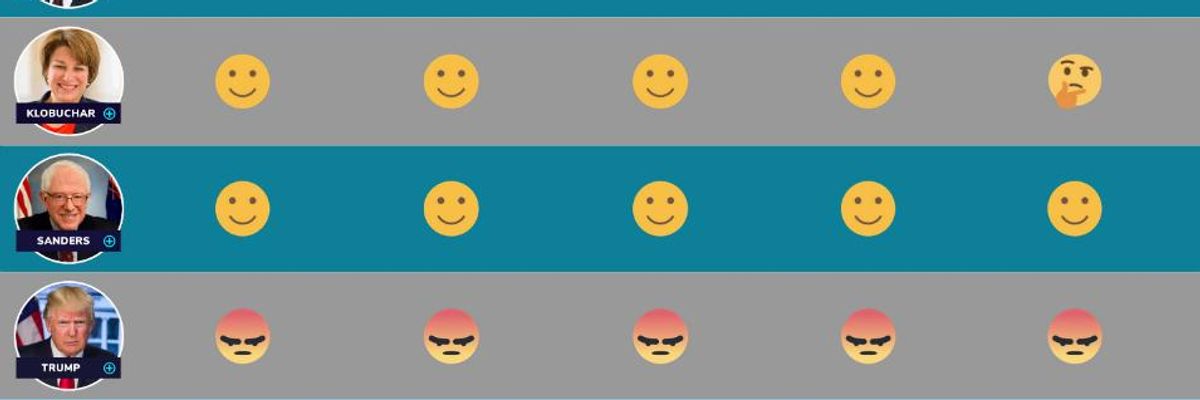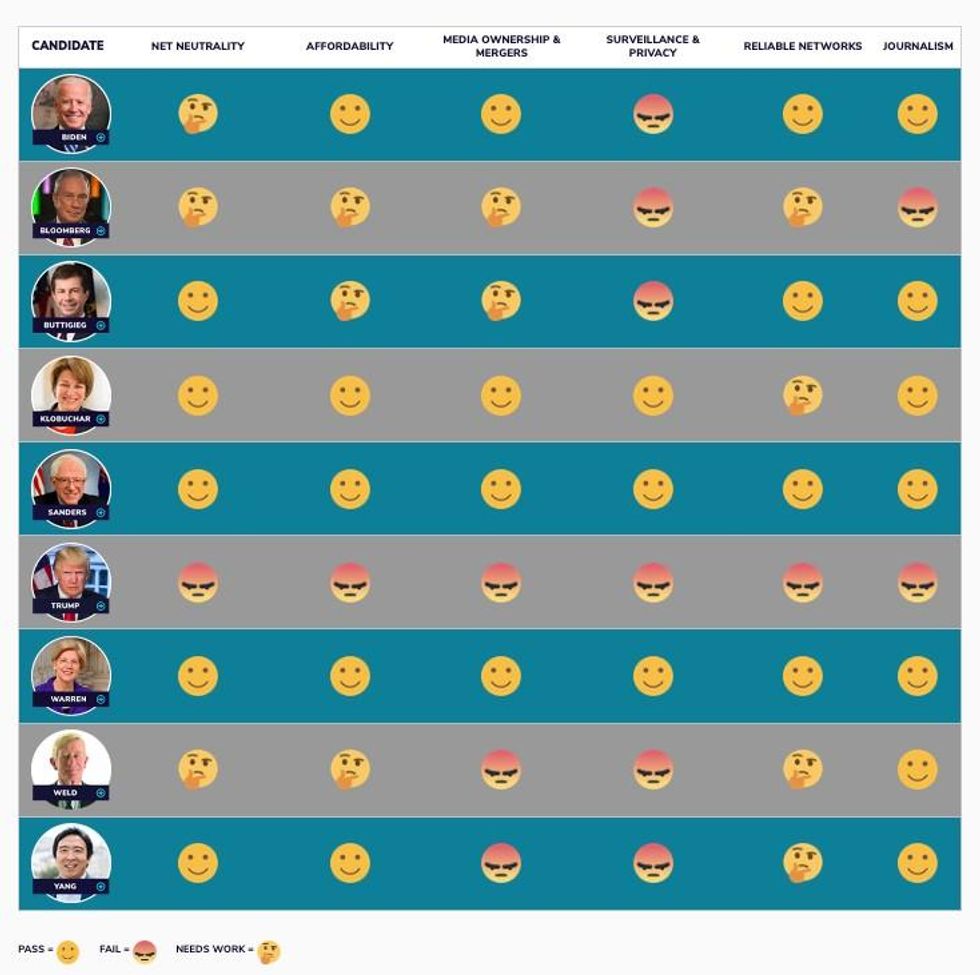From naming the press an "enemy of the people" and destroying Net Neutrality to advancing mega-mergers and fighting a war on the poor, the past three years of the Trump administration have been an unmitigated disaster for anyone who cares about an open internet, the future of journalism or creating an equitable media system.
In a time of impeachment, looming climate disaster and kids being caged at the border, media and tech issues haven't always topped the list of debate topics. But they're closely intertwined with all of these pressing concerns and increasingly central in the campaign, as seen in Donald Trump's relentless ads attacking the media or Democratic disputes over what the hell to do about Facebook.
"Whichever candidate you support, there's never been a more crucial time to ask them what they plan to do not only to reverse the relentless attacks on communications rights in the Trump era."
There's growing and widespread recognition that the next president will have to address the digital divide, the crisis in journalism and the power that big tech and telecom companies hold over our lives.
So who's best positioned to clean up this mess?
On Thursday, Free Press Action released its 2020 "Right to Connect Voter Guide," an analysis of presidential candidates' positions on vital media and technology policies. It analyzes the positions of nine Democratic and Republican presidential candidates polling at 3 percent or above in recent national polls. (We'll update when other candidates reach that threshold, including third-party candidates.)
Here's an emoji-fied snapshot of how the leading candidates stack up so far:
The short summary is that Sens. Bernie Sanders and Elizabeth Warren stand out for their proposals to invest billions to expand internet access and rein in steep broadband prices that keep low-income families and people of color offline. Sanders has also offered the most concrete ideas to address the crisis in journalism. Sen. Amy Klobuchar also receives high marks in most categories.
The records of the other leading candidates are decidedly mixed or incomplete. Searches for detailed policy positions on these issues from former Mayor Michael Bloomberg or former Gov. William Weld have come up blank. But Trump's record is clear: Based on the past three years, the president is failing in every subject.
Our guide weighs each candidate's positions against the Right to Connect policy platform Free Press Action released last summer. We sent the platform to every campaign and pored over candidate websites, policy papers, press statements and legislative records (footnotes and sources can be found in the guide). We narrowed in on six main categories:
- Net Neutrality: All of the leading Democratic candidates but two -- Joe Biden and Michael Bloomberg -- have strongly and publicly endorsed Net Neutrality on the campaign trail. While Biden served as vice president under the Obama administration -- whose FCC passed the strong 2015 Net Neutrality rules that the Trump administration gutted -- he has thus far made no public statements about this issue. (However, he has held fundraisers with Comcast executives.)
- Affordability: The price of broadband is too damn high for many people across the country. Among the Democratic candidates, Sanders' and Warren's proposals would do the most to address this crucial issue, and Warren highlights how race factors in the digital divide. Biden, former Mayor Pete Buttigieg and Klobuchar have also put forward strong proposals in support of digital equity, albeit with fewer details. And Biden, Sanders and Warren have all taken stands against extortionary prison-phone rates
- Media ownership and mergers: Sanders and Warren have been staunch opponents of media mergers and promise to reinvigorate antitrust enforcement. Klobuchar has also spoken out against dangerous deals like Sinclair/Tribune and T-Mobile/Sprint. Biden has opposed FCC efforts to scrap media-ownership limits but has hesitated to join calls break up big tech companies. Andrew Yang has called antitrust efforts a "20th century approach to [a] 21st century problem."
- Surveillance and privacy: Sanders voted against the Patriot Act in 2001 and, like Warren, supports reining in some of its worst aspects. Biden voted for that bill, and the Obama administration's record on these issues was awful. As mayor of New York, Bloomberg -- who has said little or nothing about every other issue here -- approved and oversaw an NYPD program to surveil Muslims in New York City. Buttigieg has pledged to increase support for misguided social-media monitoring programs. To her credit, Klobuchar has sponsored several key pieces of privacy legislation, including ones that would create strong civil-rights protections for internet users. Yang has proposed treating data as property -- but this approach would fail to guard against privacy abuses and has serious civil-rights implications
- Reliable networks: As climate-related disasters worsen, the next president needs to focus on building resilient networks and protecting the communications needs of vulnerable communities. That should start with addressing the government's neglect of Puerto Rico in the wake of destructive hurricanes and earthquakes. Sanders has taken the strongest stance here, explicitly calling for "a full review of the post-disaster response to the communications crisis in Puerto Rico [to] ensure broadband and telecommunications services are swiftly restored." His proposal includes plans to invest in equitable and resilient communications networks. Biden, Buttigieg and Warren have rightly focused on recovery in Puerto Rico. The other candidates haven't said much
- Journalism: Sanders has offered the most innovative ideas about addressing the journalism crisis. Writing in Columbia Journalism Review, he highlighted Free Press' proposal to tax targeted online ads to fund civic-minded-journalism ventures. Yang proposes establishing a local-journalism fund to support noncommercial media. The other candidates, including Weld, have rebuked Trump's attacks on the press. Bloomberg, by contrast, has forbidden the journalists who work for him at Bloomberg News to investigate any of the Democratic campaigns
At Free Press Action, we don't do electoral politics. We don't endorse or oppose any candidates for office. But we hope our guide can offer an independent analysis that helps inform voters. And for any candidates who don't like our analysis: It's not too late! Each day offers a new opportunity to take better or clearer positions. As the campaign season continues, we'll update the voter guide with new information.
Whichever candidate you support, there's never been a more crucial time to ask them what they plan to do not only to reverse the relentless attacks on communications rights in the Trump era, but to put forth a bold, concrete vision for a just and equitable media system.


